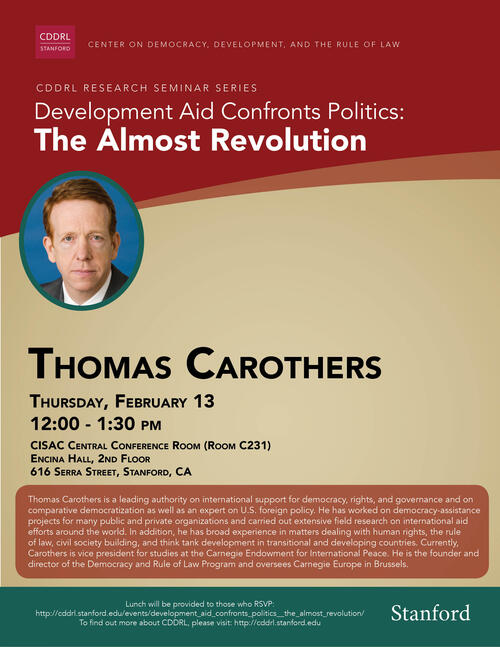The Center on Democracy, Development, and the Rule of Law (CDDRL) is pleased to introduce our 2013-14 pre and postdoctoral scholars. Selected from upwards of 100 applicants, these scholars will spend the year in residence at CDDRL to pursue their research, work closely with faculty and connect to an innovative learning community. Hailing from Yale University, New York University, Georgetown University and Stanford these scholars bring diverse backgrounds and expertise to enrich the ranks at CDDRL. Please read the Q&A's below to learn more about our new scholars, their research and what brought them to CDDRL.
Hometown: Slovenska Bistrica, Slovenia
Academic Institution: New York University
Discipline and expected date of graduation: PhD, May 2013
Research Interests: Human rights, Gender and Ethnic Discrimination, State Failure, International Organizations, and using Quantitative and Experimental Methods.
Dissertation Topic/Title: Essays on Human Rights
What attracted you to the CDDRL Pre/post-doctoral program? I am excited to become a post-doctoral fellow at the Center because my work closely fits the scholarly agenda of CDDRL. While human rights form the core of my dissertation, I touch on several other topics central to CDDRL—I evaluate the efficacy of a strong mechanism for promotion of democracy, I explore how much worse human rights abuses are in failed states, and I examine the conditions under which ground level NGO action can decrease discrimination against a vulnerable population. The faculty affiliated with the Center have a great deal of expertise in areas relevant to my research efforts - ranging from human rights and consolidation of democracy to field experiments - and I very much look forward to their guidance and advice.
What do you hope to accomplish during your year-long residency at the Center? My central aim is to complete the next phase of my research project on discrimination against the Roma in Central and Eastern Europe, while writing a book manuscript that stems from the same project. I hope to build relationships and potentially develop collaborations with members of the academic community at CDDRL and Stanford more generally.
Please state a fun fact about yourself! I used to compete in ballroom dancing.
Hometown: Stanford, CA
Academic Institution: Yale University
Discipline and expected date of graduation: Political Science, Spring 2014
Research Interests: International Relations, Middle East, Colonialism, Gender Politics, Islamic Law, Demography
Dissertation Topic/Title: "The Long-Term Impact of Colonization on Gender"
What attracted you to the CDDRL Pre/post-doctoral program? Improving gender equality is correlated with improved economic growth, democratization and rule of law. In addition to these research themes, CDDRL's focus on both scholarship and policy-relevance is important to me. I hope that understanding the processes leading to changes in gender equality over time will help us pursue better policies for advancing gender equality.
What do you hope to accomplish during your year-long residency at the Center? I hope to turn my thesis into multiple articles. I also intend to write a short monograph analyzing the relationship between opinions on gender, religion and political party affiliation in the Middle East through use of satellite data to proxy for religious piety.
Please state a fun fact about yourself! I live in the same housing complex that I lived in as a child.
Hometown: Los Angeles, CA
Academic Institution: Stanford University
Discipline and expected date of graduation: PhD, Political Science, September 2013
Research Interests: Historical Political Economy, Development, Colonialism, South Asia, Identity Politics, Terrorism
Dissertation Topic/Title: "Diversity and Power: Caste in Colonial India"
What attracted you to the CDDRL Pre/post-doctoral program? Much of my work is on the historical origins of underdevelopment, and I'm interested in exploring contemporary policies that can alleviate these inequalities.
What do you hope to accomplish during your year-long residency at the Center? I hope to develop my dissertation into a book, particularly by adding material on the post-colonial period.
Please state a fun fact about yourself! I make a very good chana masala.
Hometown: Cairo, Egypt
Academic Institution: Georgetown University
Discipline and expected date of graduation: Political Science; 2013-2014
Research Interests: Democratization, Identity Politics and Distribution, Authoritarian Elections, Political Islam; Political Economy of Authoritarianism
Dissertation Topic/Title: “Indispensible Arbiters: Islamist Movements, Economic Liberalization, and Authoritarian Rule in the Arab World”
What attracted you to the CDDRL Pre/post-doctoral program? What I find most appealing about CDDRL is its demonstrated commitment to advancing innovative, rigorous research on questions pertaining to the challenges of democratization and other related topics that speak directly to my current work. It hosts a distinguished set of scholars whose work has been highly influential in informing and guiding my own research. As home to the Arab Reform and Democracy Program, CDDRL also offers a great opportunity for engaging with scholars and practitioners who share my strong interest in developing research agendas that could enhance understanding of the Arab uprisings, their origins and the dynamic political and social struggles they encompass.
What do you hope to accomplish during your year-long residency at the Center? During my residency at the Center, I look forward to finishing my dissertation writing, along with a number of related research projects pertaining to the relationship between contentious politics and formal electoral competition in the aftermath of the Arab uprisings.
Please state a fun fact about yourself! I’m a dedicated bikram yogi and a strong believer that every great idea begins with a deep backward bend.
Hometown: Bay Area
Academic Institution: Stanford University
Discipline and expected date of graduation: Anthropology, June 2015
Research Interests: Critical ethnographic approaches to development and the state, the role of traditional authorities in post-colonial democracies, global health, citizenship, human rights, and discourses of participation and community in Southern Africa, particularly Malawi.
Dissertation Title: "Health Promotion, Citizenship, and Rural Governance in Malawi"
What attracted you to the CDDRL Pre/post-doctoral program? I am drawn to CDDRL's focus on the complex intersections between development and governance, and to the Center's embrace of both theoretical and policy dimensions of scholarship on these themes. My dissertation research in Malawi examines how modular global health interventions engage local power structures, patronage systems and political cultures. In particular, I focus on traditional authorities' involvement in rural health promotion and examine the continuing salience of chiefly governance for local and national discourse on community participation, human rights and citizenship. I draw on ethnographic fieldwork and archival research to trace the salience of health promotion strategies for the formation and consolidation of ideas, values and processes of governance and democracy in Malawi. I look forward to stimulating conversations with faculty and visiting scholars through the Center's Programs on Poverty and Governance and Human Rights and the CDDRL-affiliated Center for Innovation in Global Health.
What do you hope to accomplish during your year-long residency at the Center? I will be returning from 18 months of fieldwork in Malawi this fall and am excited to join CDDRL's diverse community of scholars. I aim to complete a draft of my dissertation during my fellowship year. As a social and cultural anthropologist, I especially look forward to sharing my findings and seeking feedback from faculty mentors and fellows in other disciplines with shared interests in the quality of and contestations around democratic processes in post-colonial African states.













